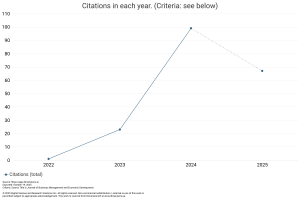Career Development in Military Court
DOI:
https://doi.org/10.59653/jbmed.v2i03.896Keywords:
career development, military court, government employeesAbstract
Career development is an employee's point of view that provides an overview of future career paths in the organization and signifies the long-term interests of the organization to employees. In developing employee careers, organizations need to provide good support regarding information, training, and opportunities that will have a positive impact on the organization. This study aims to determine the level of employee career development at the Military Court in Medan Indonesia. The sampling technique was total sampling with a sample size of 76 people. Data collection was done through questionnaires. This study used One-Way ANOVA and cross tabulation. The results of this study concluded that career development in the Military Court is in the high category. Career development of military employees is high and career development in government employees is low. This study can be a guideline for organizations to see the level of employee career development and invest in improving career development.
Downloads
References
Benson, G. S., Finegold, D., & Mohrman, S. A. (2004). You paid for the skills, now keep them: Tuition reimbursement and voluntary turnover. Academy of Management Journal, 47, 315–331. doi:10.2307/20159584
Crowley, H., & Marian. (2012). Re-conceptualizing the career development of self initiated expatriates: rivers not ladders. Journal of Management Development, 31 (2): 130-141.
Dessler, G. (2009). Manajemen sumber daya manusia. PT. Prenhallindo, Jakarta, Prentice Hall.
Eisenberger, R., Rhoades, L, & Cameron, J. (1999). Does pay for performance increase or decrease perceived self-determination and intrinsic motivation? Journal of Personality and Social Psychology, 77(5), 1026-1040. https://doi.org/10.1037//0022-3514.77.5.1026
Gibson, James, L; John. M. Ivancevich & J.H. Donelly. (2013). Organisasi dan manajemen, perilaku, struktur, proses. Terj. Djoerban Wahid. Jakarta: Erlangga.
Hall, L. M., Waddell, J., Donner, G., & Wheeler, M. M. (2004). Outcomes of a career planning and development program for registered nurses. Nursing Economic$; 22(5):231-238.
Heilmann, S. G., Holt, D. T., & Rilovick, C. Y. (2008). Effects of career plateauing on turnover: A test of a model. Journal of Leadership & Organizational Studies, 15, 59-68. http://doi.org/c5xhr6
Hofstetter, H., & Cohen, A. (2014). The mediating role of job content plateau on the relationship between work experience characteristics and early retirement and turnover intentions. Personnel Review. 43(3), 350–376. Doi:10.1108/PR-03-2012-0054
Ivancevich, J., Konopaske R., & Matteson, M. (2007). Perilaku dan manajemen organisasi (Alih Bahasa Gina Gania) (7th ed). Erlangga: Jakarta.
Kankanhalli, A., Tan, B. C. Y., & Wei, K. K. (2005). Contributing knowledge to electronic knowledge repositories: An empirical investigation. MIS Quarterly, 29(1), 113-143. https://doi.org/10.2307/25148670
Kaseger, & Regina Gledy. 2013. Pengembangan Karir Dan Self – Efficacy Terhadap Kinerja Karyawan Pada PT. Matahari Departement Store Manado Town Square. Jurnal EMBA. 4 (1) : 342-350.
McCleese, C.S. & Eby, L.T. (2006). Reaction to job content plateau: Examining role ambiguity and hierarchical plateaus as moderators. The Career Development Quartelly, 55: 64-75. https://doi.org/10.1002/j.2161-0045.2006.tb00005.x
Nelson, J., Sassaman, B., & Philips, A. (2008). Career ladder program for registered nurses in ambulatory care. Nursing Economic$; 26(6):393-398.
Orpen, C. (1994). Interactive effects of work motivation and personal control on employee job performance and satisfaction. The Journal of Social Psychology, 134(6), 855-856. DOI: 10.1080/00224545.1994.9923021
Rivai, & Veithzal. 2011. Manajemen Sumber Daya Manusia Untuk Perusahaan. Jakarta: PT. Raja Grafindo Persada.
Rhoades, L., & Eisenberger, R. (2002). Perceived organizational support: a review of the literature. Journal of Applied Psychology, 87(4), 698–714. https://doi.org/10.1037/0021-9010.87.4.698
Sari, E., & Sinulingga, J. 2011. Pengaruh Pengembangan Karir Dan Kompensasi Terhadap Motivasi Karyawan. Jurnal Ilmiah Penelitian Manajemen Manajerial, 2(1) : 431-440.
Sugiarti, E. (2022). The influence of training, work environtment and career development on work motivation that has an impact on employee performance at PT. Suryamas Elsindo Primatama in West Jakarta. International Journal of Artifical Intelegence Research, Vol. 6, No. 1. DOI: 10.29099/ijair.v6i1.304
Weng, Q. (2010). Career Growth Study: Scale development and validity test. Management Review, 22(10), 22-31. DOI:10.14120/J.CNKI.CN11-5057/F.2011.10.017
Weng, Q. X., McElroy, J. C., Morrow, P. C., & Liu, R. (2010). The relationship between career growth and organizational commitment. Journal of Vocational Behavior, 77(3), 391–400. https://doi.org/10.1016/j.jvb.2010.05.003
Weng, Q.X., Yang, H. & Cao, X.X. (2017). Relationship of Researcher’s Career Growth and Work Engagement with Job Performance. Science Research Management, 38, 144-151. http://en.cnki.com.cn/Article_en/CJFDTotal-KYGL201706017.htm
Zhou, X., Yu, J.M. & Cao, G.L. (2015). The relationship between career growth and employee engagement: Based on the mediating effect of organizational commitment. Soft Science, 10, 88-91. http://en.cnki.com.cn/Article_en/CJFDTotal-XUXI201510019.htm
Zulkarnain, Z., Mahamood, Y., & Omar, F. (2010). Implication of career development and demograpic factors on quality of work life. Jurnal Psikologi UGM, 37(1), DOI:130113. 10.22146/jpsi.7690
Downloads
Published
How to Cite
Issue
Section
License
Copyright (c) 2024 Sri Ulina Ginting, Vivi Gusrini Rahmadani, Zulkarnain

This work is licensed under a Creative Commons Attribution-ShareAlike 4.0 International License.
Authors who publish with this journal agree to the following terms:
- Authors retain copyright and grant the journal right of first publication with the work simultaneously licensed under a Creative Commons Attribution-ShareAlike that allows others to share the work with an acknowledgement of the work's authorship and initial publication in this journal.
- Authors are able to enter into separate, additional contractual arrangements for the non-exclusive distribution of the journal's published version of the work (e.g., post it to an institutional repository or publish it in a book), with an acknowledgement of its initial publication in this journal.
- Authors are permitted and encouraged to post their work online (e.g., in institutional repositories or on their website) prior to and during the submission process, as it can lead to productive exchanges, as well as earlier and greater citation of published work (See The Effect of Open Access).





























